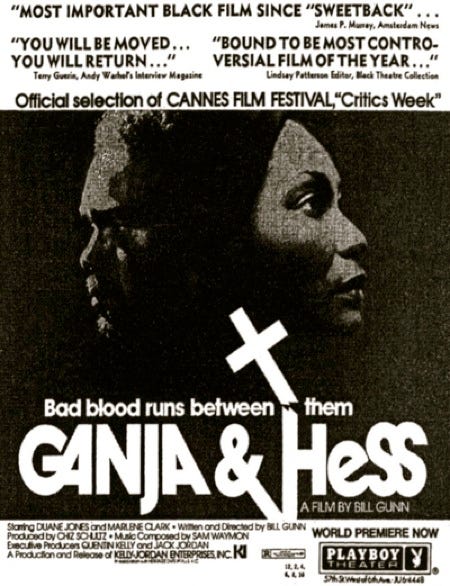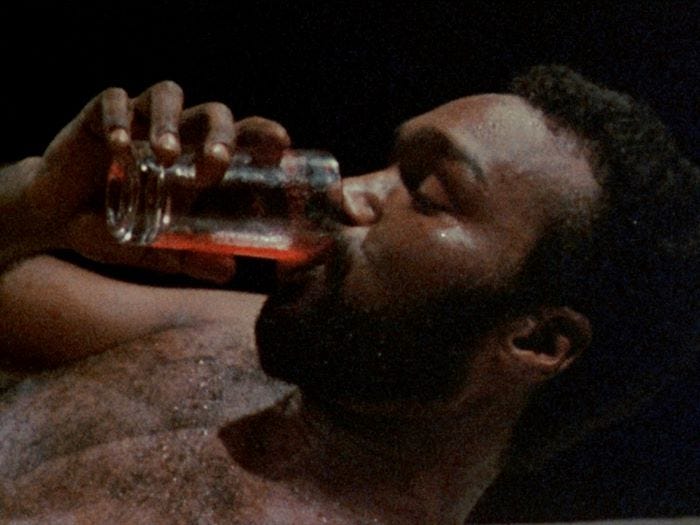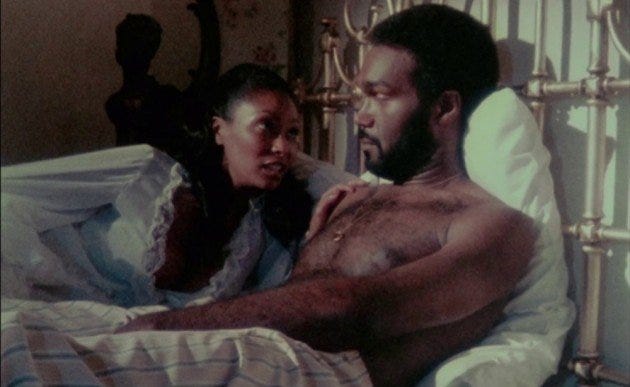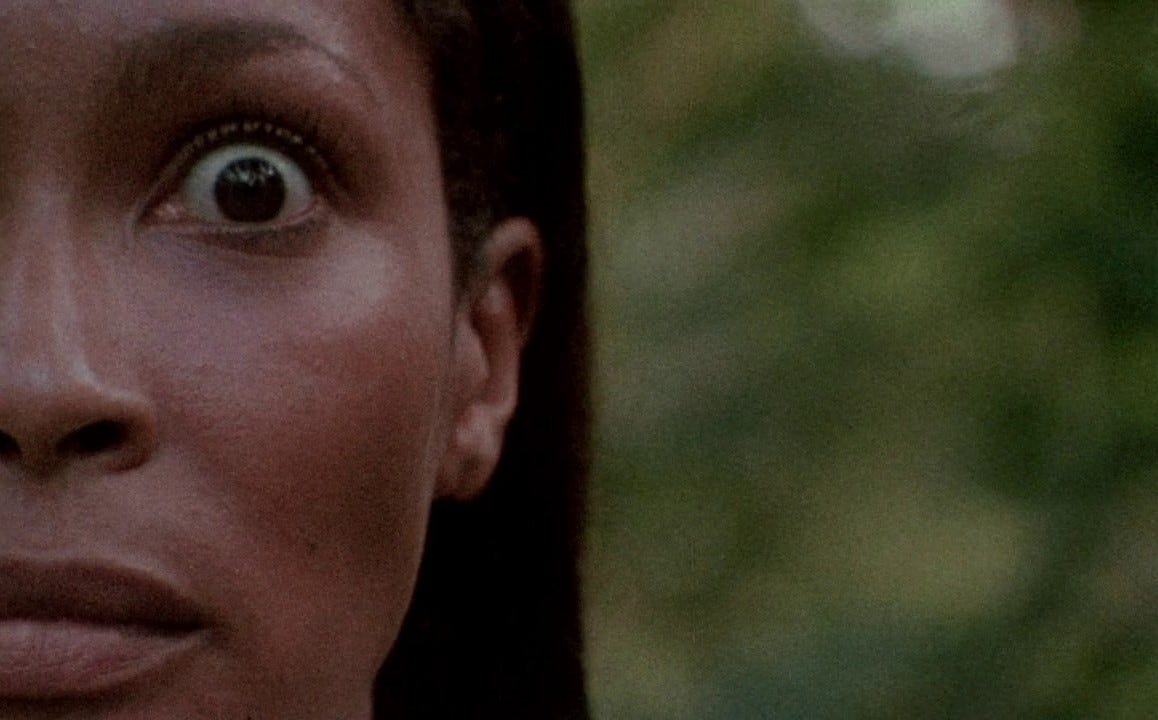Blaxploitation Education: Ganja & Hess
I suppose this could be called a horror movie, but it's a much less traditional one then Blacula.
Ganja & Hess
Written and directed by Bill Gunn
1973
One of the great things about the Blaxploitation movement is that it introduced new voices into the world of film. With attention suddenly being paid to Black audiences and a need to feed the hunger for Black-centered stories, filmmakers were being given the chance to make audience-pleasing movies featuring characters who dealt with relatable issues but were able to overcome oppression. The success of these movies meant that more and more of them were being created, and at the same time, some filmmakers were able to create more idiosyncratic, personal works, ones that didn’t always line up with expectations.
Ganja & Hess falls into the latter category, and, well, the fact that it’s a unique and personal vision is probably the best thing I have to say about it. It’s a bizarre take on a vampire movie, with a plot that’s hard to follow and lots of stylistic flourishes that range from somewhat interesting to aggravatingly off-putting. It’s even less coherent than the output of Melvin Van Peebles (Sweet Sweetback’s Baadasssss Song, Don’t Play Us Cheap), and while it probably has some type of message it’s trying to convey, it’s pretty hard to figure out. But somehow, it has gained a reputation as a good Black horror movie, and Spike Lee even remade it in 2014 as Da Sweet Blood of Jesus.
The plot of the movie is confusing enough to require some opening captions saying that the story is about a doctor who was stabbed three times with a cursed dagger, giving him an insatiable thirst for blood. That was probably necessary because I don’t think the dagger he is stabbed with is ever introduced or explained. Instead, the doctor in question (I think he’s more of a university professor than a medical doctor, perhaps studying archaeology or something similar), Hess Green (Duane Jones, the star of Night of the Living Dead) is introduced to his new assistant, George Meda (Bill Gunn, who also directed), who comes to hang out with him at his mansion. Meda acts really weird, telling odd stories about working on a film in Amsterdam, getting drunk, and threatening to kill himself, and that night, he sneaks in to Hess’s room, attacks him, and stabs him with the ancient dagger (which I think was just laying on the nightstand?).
The next morning, Meda types out a manifesto of sorts that he reads aloud, expounding on some nonsensical philosophy (“There is a dreadful need in man to teach; it destroys the pure instinct to learn.”). Then he takes a bath (in a gross moment, he brushes his teeth and rinses out his mouth with the bathwater), after which he pulls out a gun and shoots himself in the heart. When Hess overhears, he comes in and can’t help but lick up the blood that is pooling on the bathroom floor.
This sets off a sort of reign of vampiric terror, including a scene where Hess goes to a bar and picks up a prostitute, and when she and her pimp try to rob him, he ends up killing them both so he can drink their blood. He also steals some blood from a blood bank to feed his hunger. But while it’s sort of implied that he has a need to keep drinking blood, that desire doesn’t seem especially urgent, and he mostly keeps going on with his life.
Things hit a potential snag when Meda’s widow (Marlene Clark, who was in Slaughter) shows up and wants to know what happened to him. When Hess tells her that Meda has gone missing, she still insists on coming to stay in Hess’s house, and before long, they’re getting it on. She’s the other half of the duo in the title, which means that her name is Ganja, although the fact that this is also a nickname for marijuana is never remarked upon. She does bring a little bit of life to the movie, being witty and flirtatious and generally seeming like fun to be around, making her a nice contrast to the morose Hess.
Unfortunately, the brightness of her attitude changes when she accidentally discovers Meda’s body while looking for some wine in the mansion’s cellar. She confronts Hess about it, and it seems like she’s going to stalk away angrily when he doesn’t say anything, but then she sits down and delivers a long monologue about how she felt like her mother never loved her as a child. And the next thing you know, she and Hess are getting married, and then he stabs her with the dagger so she can be a vampire along with him.
Their vampiric activities consist of a long scene in which Ganja and Hess have dinner with a young man, then she has sex with him before they kill him. After this, Hess seems disillusioned with their way of life, and he reads something in a book about vampires being destroyed by the shadow of the cross. This inspires him to go and give his soul to Jesus at the church where his chauffeur serves as the pastor, after which he returns home and dies. And that’s pretty much the end of the movie.
If that all sounds pretty nonsensical, it’s possible that there’s a better explanation for everything that happened, but I just couldn’t figure it out. But it’s also because the movie doesn’t really care to explain things. It’s full of jarring cuts and lengthy discursions, along with long scenes in which little happens. Whenever Hess is overcome by his bloodlust, he seems to hear chanting from African tribespeople and occasionally sees visions of a chieftess. However, this is also often accompanied by a loud buzzing sound that becomes so irritating that it’s hard to concentrate on what’s happening on screen. While it may be an attempt to convey the unpleasant, oppressive feelings that the character is experiencing, I do think that inflicting actual pain on your audience is not the best strategy for a filmmaker to use.
There’s definitely a vision at work here, and Gunn is certainly trying to do something different, giving everything a surreal, moody atmosphere that emphasizes the characters’ disorientation. He comes up with some cool shots and memorable imagery; I liked a shot of Ganja’s face that was bisected by the edge of the frame, followed by a memorable image of her screaming while being stabbed with the dagger. Unfortunately, I found the movie to be baffling for the most part, and perhaps I’m desensitized by watching a lot of horror movies, but I didn’t find anything that happened to be especially disturbing. The only real message I can discern seems to be about the importance of the Christian faith as a corrective to the secular humanist emphasis of modern life (and maybe the dangers presented by the heathen ways of the old world?), but that’s not one that I can get on board with. As it is, I’ll have to just be happy that I experienced something fairly unique, even if it didn’t work for me.
Blaxploitation Education index:
UpTight
Cotton Comes to Harlem
Watermelon Man
The Big Doll House
Shaft
Sweet Sweetback’s Baadasssss Song
Super Fly
Buck and the Preacher
Blacula
Cool Breeze
Melinda
Slaughter
Hammer
Trouble Man
Hit Man
Black Gunn
Bone
Top of the Heap
Across 110th Street
The Legend of N***** Charley
Don’t Play Us Cheap
Shaft’s Big Score!
Non-Blaxploitation: Sounder and Lady Sings the Blues
Trick Baby
The Harder They Come
Black Mama, White Mama
Black Caesar
The Mack
Book of Numbers
Charley One-Eye







